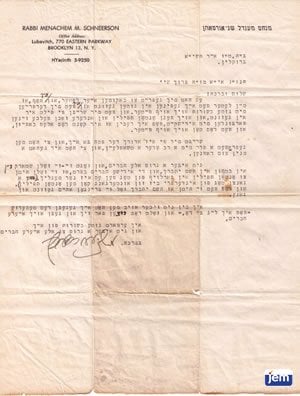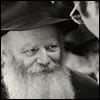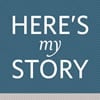
My name is Bernie—in Hebrew, Baruch Shlomo—Cytryn. I was born in 1927 in Kielce, Poland. When I was 12 years old the war broke out, and we were all herded into a ghetto. In 1942 the Kielce ghetto was liquidated, and we were put on a cattle train to Auschwitz.
I was moved around to several concentration camps. First I was in Auschwitz, then Bergen-Belsen, Sachsenhausen, Oranienburg, Mauthausen, Dachau, Gross-Rosen and other places. Though my family perished, somehow I survived.
On April 27, 1945, I was liberated by the American Army. I told the HIAS – the Hebrew Immigration Aid Society, which was taking care of the refugees—that I had family in America, and they located an aunt who brought me to Brooklyn. After a time I moved to Crown Heights—272 Kingston Avenue—right around the corner from the Lubavitcher synagogue. I befriended Rabbi Eliyahu Gross, and from time to time he would take me to Chabad gatherings.
In 1950, when the Korean War broke out, I wanted to serve. My relatives were against it, but I felt I owed a thank-you to America.Meanwhile, I got a call-up letter from the US Army. This was 1950, when the Korean War broke out. I wanted very much to serve because the American Army saved me. My relatives were against it, but I wanted to serve because I felt I owed a thank-you to the young American boys—not much older than me—who had saved thousands of us Jews.
When I told Rabbi Gross that I was going to Korea, he said that I had to meet the Rebbe and get his blessing. He arranged everything.
I was already in uniform when I went to see the Rebbe. So I went inside, and the Rebbe greeted me and told me to sit down. He was a beautiful man. I especially remember his blue eyes—they were blue like the ocean, like the sky . . . He was so warm, so very nice. I felt wonderful sitting with him and listening to what he had to tell me. He asked me questions, and I answered whatever I could.
He told me that I would be okay, that I would survive the war—the bullets would fly but would not touch me. And that’s the way it was—the bullets were flying at me—many times I heard that unmistakable whoosh of a bullet passing within inches of me. I didn’t hear who shot the bullets, because trucks were coming, tanks were going; I couldn’t hear where the bullets came from—I just heard whoosh, whoosh—but they all missed me, and I believe the Rebbe’s blessing kept me alive.
Many times I heard that unmistakable whoosh of a bullet passing me, but they all missed me.In that extraordinary meeting when I received the blessing, the Rebbe also told me to make sure to put on tefillin and pray every day, and if there were other Jewish boys with me, then I should talk to them and tell them to also put on tefillin and pray. And when we parted, he shook hands with me and gave me another blessing to come home safe.
So I went over to Korea—I was in Company A, 116th Engineers Combat Battalion, along with about 150 men. While I was in Korea I received a letter from the Rebbe. I still have this letter because it was a treasure to me. It was in Yiddish. This is what he wrote:
Greetings and blessings. I was pleased to receive your letter. I hope my letter finds you in good health, and that you’ll continue to share good news in the future. Please write to me about your health, and also about your donning tefillin and other Jewish activities . . .
Please write to me how Passover was, and whether the Seder was conducted by a rabbi or a chaplain. Did you have a minyan for the holiday prayers?
When I was most afraid, the Rebbe’s letter gave me hope. I believe his blessing kept me alive.Please give my best regards to all your comrades. Encourage them to strengthen their trust in G‑d, Blessed be He. As for your Jewish friends, in particular, encourage them to take care to put on tefillin in the course of the day, whenever possible . . . This will protect them that G‑d should bring them home safely.
I await good tidings from you . . .
With blessing, Rabbi Menachem Mendel Schneerson.

When I read this letter, I couldn’t put it down. I just read it over and over. I was just so excited. I kept it and guarded it like I guarded my rifle. It meant so much to me, because I do believe that the Rebbe’s blessing and his letter saved my life. I was in the engineers—which meant I was the first on the front line; I was the first one to face the enemy. There were many close calls. Many of my friends were killed, and many more injured. I was in many, many battles—I cannot even recall now how many—but with so many of my friends getting hit and hurt, nothing happened to me.
When I was most afraid, the Rebbe’s letter gave me hope. Sometimes when I was on guard duty, I would become very nervous—the moon would shine and the wind would move the leaves, and I imagined that the enemy was coming to kill me. But when I would pick up the letter, it would bring me back—it would give me courage.
I always had the letter in my pocket with me, along with four grenades, and whenever I got nervous, I would read it. It gave me the feeling that no matter what happens, I was going to make it and come home. And I believe this was because of this letter and the blessing the Rebbe gave me. And here I am, sixty years later, telling this story.









Join the Discussion